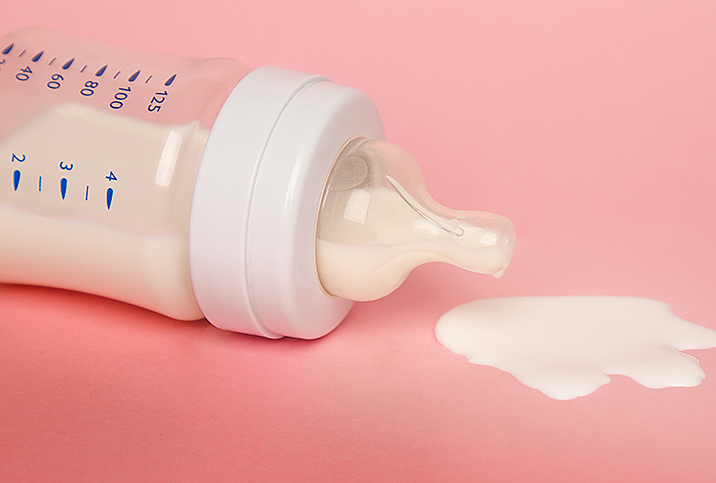What Experts Say About Breastfeeding Twins

The chances of having twins have never been higher in the history of humanity, with 1 out of 42 births being twins, so more parents than ever are thinking about breastfeeding two babies at once.
Even though it can be daunting, breastfeeding twins is possible if you follow advice from health professionals and twin parents and learn what works best for you.
We talked to a variety of professionals, from certified lactation coaches to doctors to moms who've experienced the journey of feeding two babies at once. Here's what they said.
Expert tips
Nina Pegram, an international board-certified lactation coach with SimpliFed in Ithaca, New York, recommended rolling with the punches in the early days of having twins, especially as 60 percent of twins are born before 37 weeks or full-term gestation. Sometimes a premature baby can take longer to learn to breastfeed effectively.
Pegram stressed the importance of "being realistic in terms of goals and being flexible. Twins might need more interventions after birth, and plans might change."
While it's difficult to prepare in advance, she believes a double electric breast pump is a breastfeeding necessity. Many insurers provide one as part of their coverage. Once you have it, sterilize it and learn how it works so it's ready when you need it.
Tara Scott, M.D., medical director at Forum Health in Akron, Ohio, breastfed her twins and found pumping helped her establish a good milk supply to feed them. She pumped after each feeding for the first 10 days. While this was time-consuming, she said that after 10 days, the practice increased her supply so she didn't need to pump after two weeks.
She recommended generally keeping healthy, eating healthy and getting into the habit of hydrating prior to giving birth.
Should you tandem feed?
Even though twins can be fed simultaneously, it may be necessary to feed them one at a time in the early days, especially when they are not able to support their own heads and you're both still learning to latch effectively.
Scott's twins were born six weeks premature, and she tandem-fed them in the football (or clutch) hold when they reached 8 weeks old. Parents can rotate breasts each feeding or keep each twin on the same breast for the whole day and then switch the next day, she said.
Pegram said there are no hard-and-fast rules for feeding twins as long as everyone is comfortable.
"Some moms tandem feed, some prefer one at a time and alternate. For some, it just depends on the time of day," Pegram said.
Tandem feeding can help make feeding sessions shorter, but only when the time is right, said Nichole Salisbury, R.N., an international board-certified lactation consultant at Broward Health Lactation Center in Coral Springs, Florida.
Salisbury recommended doing an entire feeding at one breast and then offering the opposite breast to each twin at the next feeding. Using this method can help both twins get a comparable amount of milk in 24 hours.
"Since the breasts don't usually produce equal amounts of milk, it's important that one baby doesn't always feed on the same one," she explained.
She also recommended keeping a log of feedings and how long they last, as well as monitoring the amount of wet and dirty diapers, as this is the best indicator that your babies are taking in enough milk. Immediately contact your healthcare provider if you have any concerns about a baby's output.
Do what works for you
It's important to do what's right for you and your babies, stressed Amy Roskin, M.D., an OB-GYN in Fort Lauderdale, Florida, and chief medical officer at Seven Starling, a postpartum mental health platform.
As parents can feel more overwhelmed and exhausted caring for twins, Roskin believes new moms need to be heard and supported wherever possible.
"If there are supply issues, it's perfectly acceptable to combi feed. This can be supplementing breastfeeding with bottle feeding with pumped breast milk or formula," she said.
Letting someone else bottle-feed the babies can be an important way for a mom to take a short break and rest.
"Any breast milk is better than no breast milk, and a healthy, appropriately fed infant is always the goal," Pegram stressed.
She recommended setting small and achievable goals, such as pumping 2 ounces (60 milliliters) of milk a day, for example. This can help mothers who are having a difficult time breastfeeding twins to be forgiving and kind to themselves, she said.
Jami Creel, a public relations specialist at Everything Branding in Lakeland, Florida, has been breastfeeding her twins for 35 months. She recommended nursing on demand.
"There are periods of 'cluster feeding' [lots of short feeds over a few hours] and you feel like you must not be supplying enough, but it's just that you and your babies are getting into a supply-and-demand cycle," Creel said.
The supply in both breasts usually lets down at the same time, but babies don't always nurse together, so Creel used a haakaa (collection cup) to catch the milk on the other side. This helped keep her supply up. She also used a variety of breastfeeding cushions to help with the positioning of the babies and maintain the correct latch.
"Advocate for yourself and your babes. Do your research. Get second opinions. Join support groups. Follow your gut," Creel concluded.


















